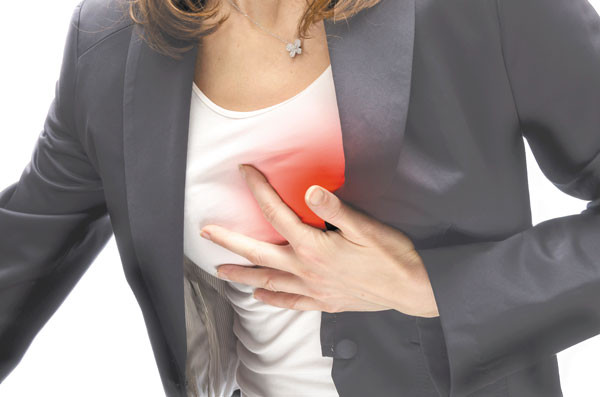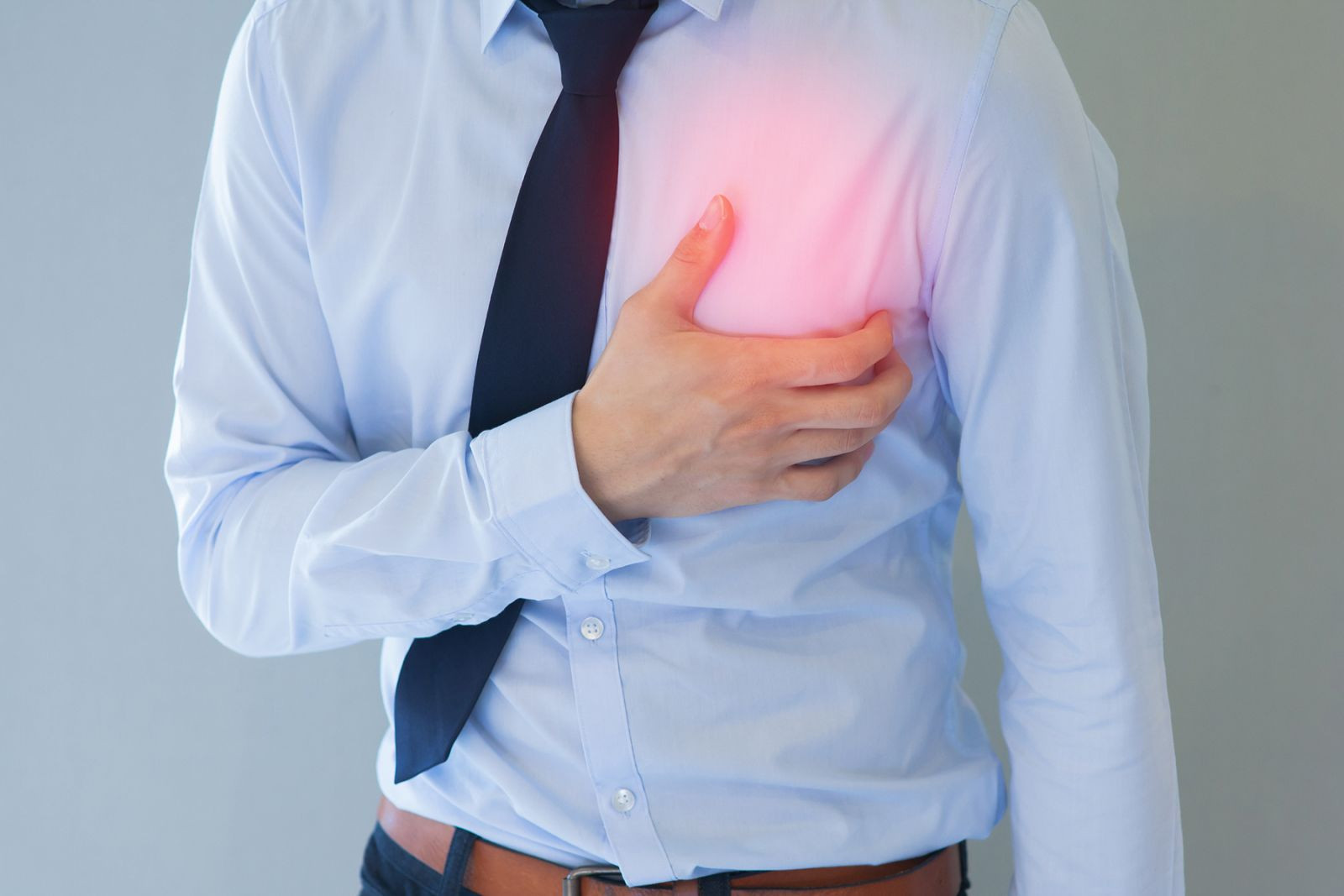
Driving with arthritis pain: Stay comfortable — and safe — behind the wheel

Daily cup of coffee may prevent afib recurrence

Gene-editing therapy lowers harmful blood fats in early study

What is EMDR therapy, and who can it help?

GLP-1 drugs versus bariatric surgery for treating obesity

Two dumbbells, three exercises, and 10 minutes

Easing the emotional burden of IBS

Modify your push-ups to meet your fitness level

What is long QT syndrome?

Stroke survivors may benefit from very low LDL levels
Heart Attack Archive
Articles
The heart attack gender gap
Heart attacks strike men at younger ages than women. But survival rates are worse in women. Why?
Compared with men, women are less likely to recognize and act upon the symptoms of a heart attack.
Image: zaganDesign/Thinkstock
Imagine someone in the throes of a heart attack. If you picture a man clutching his chest in agony, that's understandable. At younger ages, men face a greater risk of heart disease than women. On average, a first heart attack—the most common manifestation of this prevalent disease—strikes men at age 65. For women, the average age of a first heart attack is 72.
The benefits of positive thinking after a heart attack
Image: Thinkstock
A heart attack or unstable angina (sudden chest pain that happens at rest) usually requires a hospital stay. After such events—which doctors call acute coronary syndromes—about one in five people ends up back in the hospital with heart disease or dies in the following year. But there's a bright side: new research suggests that survivors with an optimistic attitude are less likely to be readmitted to the hospital with heart problems.
The study, published in the January 2016 Circulation: Cardiovascular Quality and Outcomes, included 164 people, mostly men, who were hospitalized for acute coronary syndromes. Two weeks after the event, they filled out questionnaires designed to measure their sense of optimism and gratitude.
Heart attack and stroke risk may rise briefly after a bout of shingles
A painful, blistering rash known as shingles may temporarily increase a person's risk of a stroke or heart attack, according to a study in the Dec. 15, 2015 PLOS Medicine. Also known as herpes zoster, shingles results from a reactivation of the virus that causes chickenpox, which most adults had during childhood.
For the study, researchers analyzed the records of more than 67,000 people ages 65 and older diagnosed with shingles and either a heart attack or stroke from 2006 through 2011. They then compared the rates of cardiovascular events before and after a shingles attack. In the first week after a shingles diagnosis, the risk of a stroke rose 2.4 times and the risk of a heart attack increased 1.7 times compared with baseline risk.
Don't ignore signs of sudden cardiac arrest
You may assume that there aren't any symptoms for sudden cardiac arrest (SCA), the deadly condition that occurs when your heart suddenly stops pumping. But a study published Jan. 5, 2016, in Annals of Internal Medicine suggests that warning signs are common and often ignored. The most common warning signs were chest pain, breathlessness, palpitations, lightheadedness or fainting, nausea, and vomiting.
Researchers looked at the health information of more than 800 people who experienced SCA, mostly middle-aged men, and discovered that about half of the people had warning signs during the four weeks leading up to SCA and even 24 hours before their hearts stopped. But most of those with warning signs ignored the symptoms. Thirty-two percent of those who called 911 before SCA survived, compared with only 6% among those who didn't call for help. That's because many of the symptoms that led people to call 911 occurred in the hours just before the SCA, so these people were likely to be in a medical care setting when their hearts stopped.
Heart attack survivors can have sex without fear
Sex does not appear to trigger a heart attack or increase your risk for a second one, suggests a study in the Sept. 21, 2015, issue of the Journal of the American College of Cardiology.
Experts looked at 536 heart attack survivors ages 30 to 70 and evaluated their sexual activity in the 12 months prior to their heart attack. Sexual activity was divided into three categories: less than once a month, less than once a week, and once or more per week.
Some prostate cancer treatments increase heart attack risk
In the journals
If you have suffered a heart attack and plan to undergo prostate cancer treatment, you may want to weigh the risks and benefits of androgen deprivation therapy (ADT). ADT decreases the amount of androgens in the body, which prostate cancer needs to grow and survive. It is also often used along with radiation therapy, and the combination has been shown to prolong survival in men with unfavorable-risk prostate cancer—defined as cancer with two or more high-risk factors, like a PSA level between 10 and 40 ng/mL, a Gleason score of 7 or higher, or biopsies with 50% or higher cancerous cells.
But a study in The Journal of the American Medical Association suggests that men who had a prior heart attack can increase their risk of a fatal one if they undergo both radiation therapy and ADT. Researchers compared overall survival and death from prostate cancer, fatal heart attack, and other causes in a group of 206 men with unfavorable-risk prostate cancer. The men received either radiation alone, or radiation and six months of ADT. The researchers also categorized the men into subgroups based on other health conditions, including heart disease.
Heart attack despite low cholesterol?
Ask the doctor
Q I have a relative who had a total cholesterol value of 155, yet he still had a heart attack with 90% blockage in one artery. How could that happen?
A I understand your confusion, considering how doctors have long focused on the importance of having an optimal total cholesterol level (less than 200 milligrams per deciliter or mg/dL) as a way to lower the chance of having a heart attack. It's actually the harmful LDL cholesterol value that's most important in terms of this risk. However, a person with a total cholesterol level of 155 mg/dL probably has an LDL level under 100 mg/dL, which is currently considered a reasonable target for avoiding heart disease.
How old is your heart?
To use the online heart age calculator, the only numbers you need are your height, weight, and blood pressure reading.
Most Americans are not as young at heart as they might like to believe. More than three in four adults have a "heart age" that's greater than their chronological age, according to federal health officials.
Heart attacks in younger women: Less treatment, more deaths
Image: Thinkstock
Research we're watching
Women who have heart attacks before age 60 may be less likely to receive a lifesaving procedure to restore blood flow to the heart (an angioplasty plus a stent) than men in that age group, according to a study in the Oct. 26, 2015, Journal of the American College of Cardiology. (Stents are tiny mesh tubes that help keep arteries open.)
Data for the study came from a nationwide sample of more than 630,000 people ages 18 to 59 who had heart attacks. Younger women also were more likely to die in the hospital compared with younger men (4.5% versus 3%, respectively). However, men may be more likely to die before reaching the hospital than women, which may partly explain that difference, the researchers say.
A different kind of heart attack
Image: Thinkstock
Squeezing chest pain isn't always from a blocked artery.
Classic heart attack symptoms—severe pressure, heaviness, or pain in the chest—most often arise from a blockage in a coronary artery that prevents blood from reaching the heart muscle. But a lesser-known condition, called takotsubo cardiomyopathy, can produce the same sudden heart symptoms even when the coronary arteries are clear.

Driving with arthritis pain: Stay comfortable — and safe — behind the wheel

Daily cup of coffee may prevent afib recurrence

Gene-editing therapy lowers harmful blood fats in early study

What is EMDR therapy, and who can it help?

GLP-1 drugs versus bariatric surgery for treating obesity

Two dumbbells, three exercises, and 10 minutes

Easing the emotional burden of IBS

Modify your push-ups to meet your fitness level

What is long QT syndrome?

Stroke survivors may benefit from very low LDL levels
Free Healthbeat Signup
Get the latest in health news delivered to your inbox!
Sign Up








